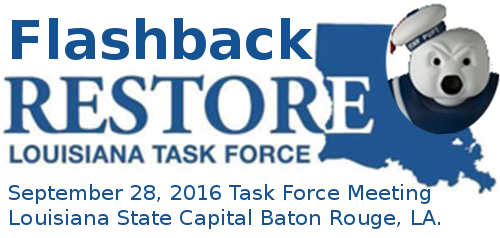By Murray Wennerlund published 11-1-2022 updated 11-1-2022
|
|
|

By Murray Wennerlund published 9-13-2018 updated 1-11-2022

By Murray Wennerlund published 9-13-2018 updated 1-11-2022
FLASH BACK to September 2016.
We you finish reading, ask yourself the following questions.
RESTORE LOUISIANA TASK FORCE
September 28, 2016
Louisiana State Capitol, House Committee Room 5
Ms. Elkins: My third is just a basic comment on SBA. They are very difficult. I think we should all understand that for housing purposes if an individual applies for SBA monies and they are granted those dollars by SBA, then it becomes a DOB. And that means if the state is giving them $90,000 and SBA gives them $90,000, then it is a DOB and it zeroes out. So what you are looking at and don't be shocked, those persons who are getting SBA loans, it is reducing the amount of money they can get from other funding. Where for people that don't go to SBA, they are eligible for grant monies for their whole repairs.
Mr. Riley: Part of the FEMA process in the individual assistance program is when you register, they will not process your registration any further unless you first gone to the SBA and applied. The individual assistance grant program in FEMA terms is a grant program of last resorts, so they are going to make you go and look for other available federal programs first. And only if you get denied for SBA or the approved loan is not sufficient to cover all of the expenses caused by the damage then the other programs and individual assistance program will kick in.
Ms. Elkins: In my experience with working with SBA, and I do this for a living, and that doesn't happen. Even here in Baton Rouge. My sister's house was destroyed, she went to FEMA, FEMA had already given her the maximum amount and she did not go through SBA. If she had and SBA had given her a $30,000 loan, she wouldn't have gotten anything from FEMA.
Mr. Riley: I'll let FEMA answer that. I know that part of the process is before they will move your application forward you have to apply to SBA. Once she has done that they come in and do the analysis and if she has gotten the max amount then she must have had significant damage.
Casey Tingle: The difference is between the funding that FEMA provides through home repair through IA occurs first and doesn't require the SBA step in order to be eligible or as there are Other Needs Assistance programs for things like contents, particular equipment, vehicles, and those sorts of things does require the SBA step before that Other Needs Assistance process kicks in.
Ms. Elkins: I just think that is what the committee needs to know for their jurisdictions, that if they have their homeowners go ahead and apply for SBA and SBA gives them a loan for $40,000 or $100,000, it becomes a DOB, a duplication of benefit, and they won't be eligible for CDBG funds and a lot of people don't understand that and they get angry when they trying to get assistance. Pat Forbes knows what I'm talking about. We didn't have that with Katrina. We used the block grant dollars to repay SBA. Well that doesn't happen anymore, the federal government put a stop to that. It's now a duplication of benefit. Even non-profit dollars are considered a DOB. And sometimes this hurts homeowners.
Casey Tingle: I think that is a valid point. I think the timing of the assistance is what creates a lot of the issues there because of the sequence of delivery. CDBG is largely an unknown until some point post disaster and based upon the impacts and congressional action, whereas FEMA, IA and SBA are enacted as soon as there is a declaration and so should the task force committee to some sort of an action plan for grant funding through CDBG for homeowners, I think you are absolutely correct and that is something that we need to be aware of.
Ms. Elkins: And homeowners do to because if you are low to mod, someone who can't afford an SBA loan and you apply for it and they give it to you and you are paying a loan when you could have gotten a grant. So those people that are doing the work right now, you know, it's sad.
Bio: Ms. Suzie Elkins Retired Executive Director OCD SUZIE ELKINS
SUZIE ELKINS
Project Manager, CDBG-DR SME
Ms. Elkins has worked with CDBG and CDBG-DR programs for over 35 years, including in the role as the director of Louisiana's Office of Community Development. She is a leader in the field of state community development programs and has a long history of working on housing and CDBG-DR buy-out projects including those in Louisiana, New Jersey and New York. While at the Louisiana Office of Community Development, she was responsible for Louisiana's state and local governments receiving billions of dollars of federal grant funds. For over thirty years she has worked closely with HUD's Office of Community Planning and Development.
HOUSING Committee:
Function: Address pre- and post disaster housing issues and coordinate and facilitate the delivery of resources to assist in the rehabilitation and reconstruction of destroyed or damaged housing, as well as develop new, accessible permanent housing options.
RLTF WORKING GROUP:
Suzie Elkins
Ted James
Jim Richardson
Joel Robideaux (lead)
Ollie Tyler
RSF 4 Contacts
Housing: Earl Randall III & Carol D. Jones
earl.randall@hud.gov
202-422-0413
carol.d.jones@hud.gov
336-662-2091
LA Lead: LHC - Ray Rodriquez: rrodriguez@ihc.la.gov
OCD: Susan Pugliese susan.pugliese@la.gov 225-219-9796